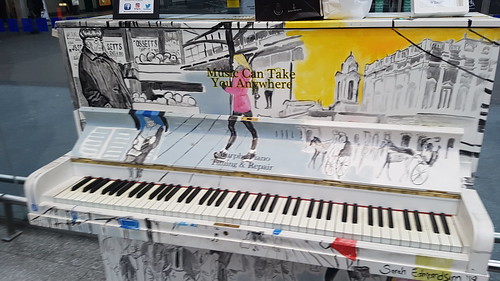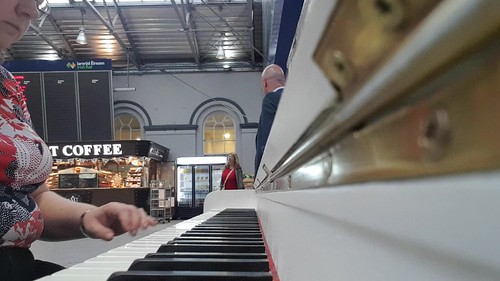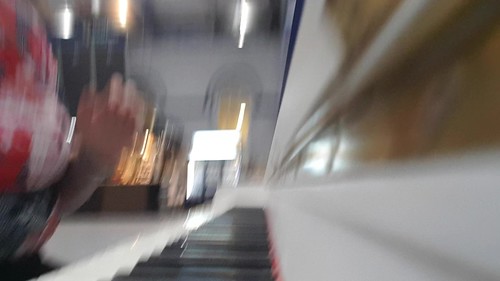Today classifies as a not particularly productive day. Missed the 7am slot (frustrating but not unusual lately). I had some time free this evening so I played random stuff by ear.
Mostly, I play piano either very late at night (thanks insomnia) or first thing in the morning, so I’m more often than not, plugged into headphones. At 7pm, I cast them off on the grounds that well, it’s not like anyone should reasonably be trying to sleep at this time. The piano sounds a lot better without the headphones. But I didn’t play especially well; this is why I prefer doing the hard graft in the mornings. My fingers hurt after a day at a computer keyboard, a day sitting down. And truth be told, my planning isn’t going that well at the moment.
I probably should do a little more planning and a little less random entertainment. Today, I played my way through the Irish stuff which is instinctive, if not second nature, Sliabh nBan now that I’ve identified the name of it. The party pieces of Trip to Ireland, Kimiad, Foggy Dew. Stuff I can play with the rhythm on Róisin Dubh. But it was more a trip to play rather than practice. I am not sure how productive it is.
I have decisions to make. There is a Christmas concert coming up which I may or may not volunteer for, and so music will have to be chosen. I will choose from the Irish repertoire because there will be other people to choose from the higher level stuff. I’ve already chosen two pieces which I will need to arrange. I’ve looked at both of them tonight but am not really sure that I have them down the way I want them to sound. So I need to think about that.
After that, one of the jobs I want to do is list all the sheet music I have to hand. There’s quite a lot. I’ve been looking for a decent sheet music manager and I haven’t really found the one I want. I don’t want to spend hours scanning music, and I prefer working with paper (Tommy Doyle talks about ForScore here and I’m really not sure). But I also don’t know how much time I want to spend typing up lists and maintaining databases. I sort of wish there was an Apple Music Match for sheet music. You know, I’d point it at my copy of Ludovico Einaudi’s greatest hits, and magically it would appear in my library. But then there is loads of other music like the stuff I download from Petrucci or Freescores or Piano Street. It’s an admin job rather than a piano job.
So yeah, that needs to be done, and I need to transcribe my own arrangements of stuff, my own occasional compositions.
Today I was looking for Christmas music from Ireland for the piano, or at least Christmas carols and I remembered that Micheal O’Suilleabhain had a piece called Oiche Nollaig which means Christmas Night. There is a very striking arrangement of it on an album called The Dolphin’s Way I think but there’s a very decent youtube video of it played by Sean de Burca.
The sheet music doesn’t seem to be available. I had a look for it.
Anyway, while I was doing that, it occurred to me that really, I know Micheal O Suilleabháin for composing and arranging and I wondered how he approached piano practice. Presumably he’s done a lot of it over the years because certain things are just really second nature to him and you don’t get there without a lot of work. I mean, my instincts to build almost anything in the keys of Am, Em, G, D, Dm, C, A and E are fairly nothing compared to some of his fun things.
I realised I did not really know how to define practice. It was much easier when I was a teenager, of course. Here’s the RIAM grade N book, here’s a bunch of scales you need to be able to reproduce. And there’s some theory you need to know. You do the grade pieces under protest. You do the scales under protest
But I don’t do the grades any more. Oh I’ve thought about it. And is it really practice if it doesn’t hurt a little? What is training really? For someone who is a composer/arranger, what do they do? How do they build their practice routine? I mean, I bet some of these guys have forgotten more music than I have ever known.
Does Micheal O’Suilleabhan spend a few hours practising his own repertoire or is that just playing for pleasure the way I see it for myself? Or does he knock out some Liszt and Chopin etudes when no one is watching?
I don’t know. I don’t even know how to imagine answering that question.
Anyway, in tandem with that, I read a rather inspiring book by Charles Cooke where he deals with restarting the piano as an adult. It was written in a very different era to mine, of course, and the exhortation to buy records (which were almost luxuries at the time) was charming in a world where all you have to do is go to Youtube, iTunes, Google Music, and find pretty much any recording you want to find, of any piece of music. Including my hated Pentatonic thing by Bartok. But Cooke had one message which is as relevant today as it was when you would be lucky if your local record store had the recording of a piece of music you were looking for. Practice.
Practice for at least an hour every day. I pretend I do this, although real life is fighting hard against it. In theory, though I practice between 7am and 8am most workday mornings at least. The question is, how do I get best out of that time?
Cooke suggests time spent between repertoire, sight reading and technique. He suggests the bulk of time should go to repertoire and it should be repertoire you like. Maybe 10 minutes should go to technique. But that you should control the repertoire and the technique you choose to do. And if you practice for an hour daily, you will get better at piano.
I know for the last 40 years that if you practice something, you will get better at it. But I don’t know how to structure the practice really at the moment and this is something I am thinking about. I know you can’t practice in a vacuum and that you need goals and objectives. I know that I will be a year at least at Valse Fantaisie and I also suspect that one of the reasons I often default to the stuff I find easy is because I find it easy and because the rate of progress with Valse Fantaisie is glacial. Also, I am a perfectionist. Those 8 bars are hard
Also, I bought Hanon, and have found it less so much tedious and rather therapeutic.
So, I am thinking more in terms of strategic planning. I have plenty of sheet music. My daily music activities often include time on the tram working through sight reading apps. I know that’s improving, particularly on the top of the staff. Does this count as practice? Well yes, even if it’s away from the piano. I need to take account of the effort there. The bottom of the staff is proving harder and I need to move to the bass clef too
In terms of repertoire, I’d like to start AND finish something. This is probably unrealistic in the short term with Chopin Ballade No 2 and Gryaznov-Glinka Valse Fantaisie. They cast a different glow on things like Nocturne in C Sharp (posth) and the Moonlight Sonata. So I see an argument in favour of working through a challenge piece and a more accessible piece.
So, in short, for my piano practice duties, I see the following being necessary:
- Scales
- Technique/Therapy Hanon
- Technique/School of Speed (Czerny)
- Repertoire Accessible
- Repertoire Impossible Dream
- Pitch practice
- Sight reading practice
- Transcription of own output
After that, I can have self indulgence time. Playing the easy stuff, the stuff I already know, the stuff I want to maintain. I need party pieces and I used to play cliche Fur Elise and cliche Mozart Sonata in C (first movement). I’ll find out soon enough if they have made it to my piano music storage here but meh, cliché.
I should probably write up some goals to be honest and also, set priorities for those days when I don’t get to everything.



